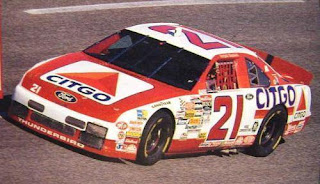In Defense of Pete Hamilton
In Defense of Pete Hamilton
By Brian H Cotnoir
I've been a resident of the Commonwealth of Massachusetts for over 30 years, it's really the only home I've ever known, but it's not really a hot spot for Auto Racing. The state at one point had three short tracks--Norwood Sports Arena, Riverside Park Raceway, and Seekonk Speedway--but only Seekonk Speedway remains active. If you were to ask race fans in Massachusetts who the state's best driver was, I'm sure most of them would say Hall of Famer Mike Stefanik, who won seven Modified Championships and two championships in the Busch North Series, however in NASCAR's top three series he never won a race, his best finish was a 2nd place at Homestead in the NASCAR Truck Series. Some older fans might say Ron Bouchard is the best driver from Massachusetts, he won the 1981 NASCAR Cup Series Rookie of the Year and won his only Cup race at Talladega the same year. Bouchard remained a popular figure throughout local short tracks in New England even after his Cup career ended, and he owned a series of successful local car dealerships too. However, there is another driver from the Bay State who won more races than Bouchard, and a Championship, and the Biggest Race in NASCAR, but is often overlooked or forgotten. That drivers name is Pete Hamilton.
Hamilton was from the Boston-suburb of Newton, Massachusetts. He made his auto racing debut in 1962 Norwood Sports Arena in Norwood, Massachusetts and within five years he had won the NASCAR Sportsman Division title (what we now know as the NASCAR Xfinity Series). The following year he made his NASCAR Cup Series debut driving for owner Rocky Hinton, at Asheville-Weaverville Speedway in North Carolina. Hamilton finished 12th in that race, and later that season at Smokey Mountain Raceway he finished runner-up (1 lap down) to his future teammate and boss, Richard Petty. Despite only running in 16-of-the-54 races that year, Hamilton managed to win NASCAR Cup Series Rookie of the Year for the 1968 season. The following season Hamilton only made three starts in the NASCAR Cup Series. He finished 44th out of 51 cars in that years Daytona 500, driving for Owner A.J. King, and scored a season best finish 5th place at Atlanta Motor Speedway driving for legendary car builder, Banjo Mathews.
The following year would be a dream season for Hamilton as he was hired to drive the #40 Plymouth Superbird for Petty Enterprises. Hamilton's crew chief for that season would be future Hall of Famer, Maurice Petty. With 9 laps to go, in the 1970 Daytona 500, Hamilton passed David Pearson for the lead, and went on to win the first race of his NASCAR Cup Series career. Hamilton would win both races at Talladega this year. The following year, Hamilton made the jump to drive for Cotton Owens, and won his final NASCAR Cup Series race at the Daytona Qualifying race (back then the qualifying races were points paying races). Hamilton never won another NASCAR Cup Series race after that and would not make a start in the NASCAR Cup Series after the 1973 season.
Despite no longer running in the NASCAR Cup Series, Hamilton still had a successful racing career. In 1974 he won for the famous Snowball Derby. In the 1980's he moved to Norcross, Georgia where he was a successful racecar builder and mentored local dirt track drivers.
Hamilton's name may not be well-known and despite only ever running part-time in the NASCAR Cup Series he put up some decent stats. In 64 career starts in the NASCAR Cup Series, Pete Hamilton scored 4 wins, 3 poles, 26 finishes in the Top 5, and 33 finishes in the Top 10. He was also hired to drive for some of the most legendary owners in NASCAR History. Cotton Owens, Dick Brooks, Banjo Matthews, and the Petty Family all hired Hamilton to drive their cars. He was inducted in the New England Auto Racers Hall of Fame in 1998 and passed away in 2017 from complications caused by a stroke.
Hamilton is probably the least well-known Daytona 500 champion, but it wasn't a fluke win. He had the same car and engine as Richard Petty, and he went on to pass another NASCAR Hall of Famer to get that win and held him off. Hamilton definitely was his most successful on the Big Super Speedways, and it's a shame that he's not remembered or as well-known today as some other drivers from his era.

.jpg)





Comments
Post a Comment